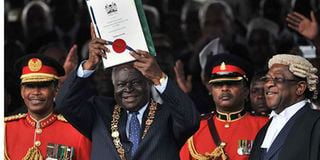Let us uphold Chapter Six of Constitution to end corruption and unethical conduct

Former President Mwai Kibaki lifts Kenya's constitution after it was promulgated at Uhuru Park in Nairobi on August 27, 2010.
Chapter Six of the Constitution of Kenya 2010 was primarily enacted to reform governance by addressing the erstwhile culture of impunity, corruption and other forms of conduct inimical to the public interest.
In entrenching a dedicated integrity chapter in the supreme law of the land, Kenyans hoped to rid the country of corruption and other governance ills that had, for decades, impeded their prosperity in the political, social, economic and cultural spheres. Chapter Six advances ethical leadership, crucial for the success of our governance structures as it entails leading by example and setting high standards of honesty and integrity.
The Constitution gave prominence to integrity in the management of public affairs. Article 73 provides that authority assigned to a state officer is a public trust, vesting in the officer the responsibility to serve, rather than the power to rule, the people. They must exercise public authority in a manner that is consistent with the Constitution, demonstrates respect to the people, and brings honour to the nation and dignity to the office.
Chapter Six prescribes integrity standards to guide the performance of public duty as further amplified under the Leadership and Integrity Act, 2012. For instance, state officers should be objective and impartial in decision-making.
Their decisions should not be influenced by nepotism, favouritism or corrupt conduct. They should uphold selflessness in service, which entails utmost dedication, diligence and honesty. Further, they should be accountable to the public and take responsibility for their decisions and actions.
High standards of discipline
State officers should uphold high standards of discipline and conduct themselves with dignity in public and private lives. They are barred from operating bank accounts outside Kenya without approval from the Ethics and Anti-Corruption Commission (EACC).
Other integrity obligations for state officers include observing the rule of law, avoiding conflicts of interest and taking care of the public property. They are prohibited from falsifying records, misleading the public or using public office to unlawfully enrich themselves.
But despite the high threshold of integrity envisaged under Chapter Six and the relevant statutes, the scourge of corruption thrives. Lest we forget, corruption undermines the effectiveness of leaders and institutions of governance and ultimately impedes the realisation of national goals.
It hurts all citizens, albeit in varying ways and degrees. It leads to increased cost of doing business, low investor confidence, high cost of living and poor quality public services and delays in access to justice. Kenyans still suffer the pre-2010 woes which they hoped to extinguish by enacting Chapter Six of the Constitution.
As evidenced by the periodic reports of Parliament’s watchdog committees, Auditor-General and EACC, many public officials have failed to live up to the Chapter Six yardstick of integrity. This has led to numerous individuals and companies being charged with corruption and economic crime—including abuse of office, conflict of interest, unlawful acquisition of public property, fraud and falsification of documents. The reports further chronicle cases of public officials ordered by the court to forfeit to the state unexplained wealth and corruptly acquired assets.
Clearly, Kenya has no shortage of legal frameworks guiding the performance of public duty. Our greatest challenge is the widespread dishonesty in our dealings.
When taking the oath of office, state officers swear to obey, respect, uphold, preserve, protect and defend the Constitution. To realise the promise under Chapter Six, therefore, they all must live by their respective oath of office. As once stated by former President Mwai Kibaki, leadership is a privilege to improve the lives of others and not an opportunity to satisfy personal greed.
Separately, private persons also have a role to play in eradicating corruption. The citizens should uphold integrity and companies maintain ethical business practices. As aptly put by Mahatma Gandhi, the world has enough for everyone’s needs but not enough for everyone’s greed. Corruption can end in Kenya if we all uphold integrity.
Mr Lolkoloi, a Certified Public Accountant of Kenya, is an advocate of good governance. [email protected].




